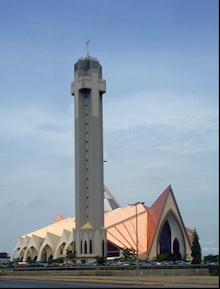|
|
|
|
 |
|
Abuja Declaration
 |
 |
 |
National Cathedral of Abuja, Nigeria |
As leaders of faith communities in Africa, we commit to highlighting the very real threat to the world's people and to our fragile creation, from the threat of catastrophic climate change. In all our religious teachings and Holy Scriptures, it is clearly stated that protecting and taking care of nature and human life is one of the main instructions of our Creator, and human beings are guardians of this earth.
Climate Change threatens to greatly increase poverty, disease and conflict in Africa. Africa has already been impacted by climate change through more floods, droughts and extreme weather conditions – but it is least equipped technically and financially to deal with climate-related risks. Subsistence farming, the main source of Africa’s food, is being threatened by climate change because it mainly relies on rainfall that is becoming increasingly erratic. Climate change may increase competition for diminishing water resources that will force people to become ‘climate change refugees’, posing challenges to peace and security in the region.
Faith leaders have a crucial role to play in pressing for changes in behaviour at every level of society. We all have a responsibility to learn and teach how to live and develop sustainably in a world of finite resources. We stress the following as our action points:
- Capacity building for faith leaders. Where possible, we will endeavour to undertake training in climate change issues.
- We commit to raising awareness of environmental ethics in our religious activities and dedicate one sermon at least once a month for issues related to climate change and environmental degradation.
- We commit to emphasising relevant verses in their Holy Books related to the environment. It is the responsibility of every believer to keep the earth clean and healthy for human life.
- We commit to sharing best practices and strengthen existing structures and practices to implement agreed positive actions for adapting to climate change and preventing environmental degradation. We commit to advising our communities how to behave in their daily activities.
- We commit to working together with leaders of different faiths and engage with government, private sector, educational institutions, youth and civil society organisations in Africa and the region. We should also involve and work with policy-makers and, where possible, hold them accountable.
- We commit to ensuring that we are a part of regional and national talks and (legal) agreements
- We commit to working together to hold developed countries to account for a reduction in emissions of greenhouse gases so that global warming is below 2 C Degree and advocate for an Adaptation or Global Climate Fund.
To help to achieve these ends, we agree to use today's meeting as the first step in an ongoing process of collaboration. We believe our communities can be key agents of change and urge the Government and the international community, wherever possible, to support our efforts to build capacity, raise awareness and promote sustainable practice.
To read about the upcoming meeting between Nigerian faith leaders about climate change, click here.
|
 |
|
|
|
|
|
 |
Faiths for Green Africa
We are working with more than 25 Christian, Muslim and Hindu faith partners in Africa. |
 |
Africa Muslim Environment Network
AMEN operated for several years as a network of Muslims in Kenya, Zambia, Tanzania, Zimbabwe and South Africa – with hopes to expand further over the next decade. Its vision: African Muslims helping African Muslims helping the Earth.
|
 |
 |
|
|

